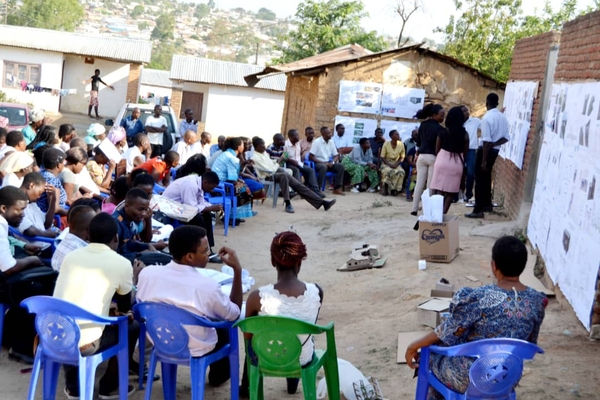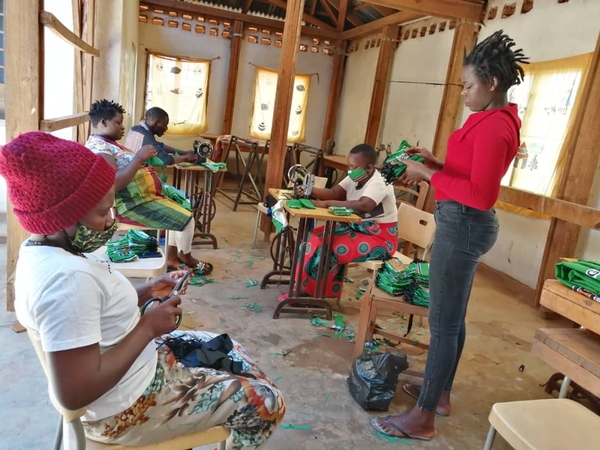- Who We Are
- How We Work
- Regional / Country Initiatives
- Legacy
- Core Themes
- Working Groups
- Portfolio & Results
- Newsroom
- Resources
Malawi: Building Climate Resilience of the Urban Poor

Project Overview
Malawi is grappling with rapid urbanisation, which has led to the proliferation and expansion of informal settlements, strained infrastructure, and inadequate basic service delivery. The surge in urban population has exacerbated challenges faced by struggling city authorities in providing essential services, while access to livelihood opportunities remains a significant challenge.
The project aims to support skill development and enhance service delivery by engaging 36 settlements. It focuses on both climate change adaptation and mitigation, fostering community partnerships, advocating for infrastructure improvements, and securing land tenure to create resilient communities. With a strong emphasis on inclusivity, the project provides employment opportunities for youth and women while promoting environmental protection. Collaborative efforts aim to enhance livelihoods and reduce vulnerabilities in urban informal settlements.
Supported by the Centre for Community Organisation and Development (CCODE), the Federation of the Rural and Urban Poor aims to empower 15,000 individuals across Blantyre, Lilongwe, and Mzuzu.
This project is part of the Building Resilience in Informal Settlements Programme, a partnership between Cities Alliance and Slum Dwellers International (SDI), funded by the Swedish International Development Cooperation Agency (Sida), to support civil society organisations working in informal settlements.

Project Results: 2022-2024
Community development efforts have yielded significant progress, particularly in economic empowerment. Over 15 federation groups have mobilised, prioritising the inclusion of women and youth. Training sessions have equipped 172 members with essential financial and business management skills. Entrepreneurial support has facilitated the acquisition of eco-friendly equipment, driving both environmental sustainability and economic growth. 1,641 savers from 25 savings groups and 43 youth have been supported.
Leadership and capacity-building initiatives have fostered collaboration and knowledge exchange among stakeholders. Gender mainstreaming efforts have empowered women in waste management cooperatives, ensuring inclusive decision-making processes.
Infrastructure enhancements have bolstered basic services and environmental sustainability. Formalising waste entrepreneur groups and conducting community dialogues have streamlined settlement regularisation and waste management practices. Through the project, 207 households have improved their water and sanitation, 223 households have improved tenure, 120 households have improved housing, while 160 households have received access to improved energy.
Under KYC, mapping Covid-19 vaccine availability and engagement meetings have heightened community awareness and participation in public health and urban planning initiatives. 4 advocacy campaigns and 10 settlement forums were conducted and 9 content creation initiatives were carried out by youth.
Advocacy and communication strategies have spurred dialogue on urbanization and climate change. Training programs have equipped community leaders with nature-based solution expertise, furthering sustainable development practices. The training also led to 114 people with improved skills in addressing climate change and 620 people with improved abilities to adapt to climate change. 85 community members further benefitted from 19 peer learning exchanges. In addition, 6 settlements have been profiled, enhancing communication and advocacy with local government.
Institutional strengthening efforts, including strategic plan dissemination and 12 federation leadership meetings, have enhanced collaboration and accountability within community organisations.

Building Climate Resilience through Cooperative Housing in Malawi
Most housing units in informal settlements in Malawi are vulnerable to extreme weather, contributing to poor living conditions and increased climate risks. To address these challenges, the affiliate has launched a climate-resilient housing initiative targeting low-income urban populations. The programme organised residents into Community Housing Associations, which empower members to collectively plan, finance and implement housing projects. By pooling resources, members gain ownership of their homes, fostering long-term sustainability and resilience. This cooperative approach builds on lessons from a previous land and housing programme, shifting away from donor dependency to a member-funded model that has already improved loan repayment rates.
Members are participating in the initiative and are saving monthly towards land and housing. In just eight months, they have collectively saved over MWK 15 million (approximately USD 8,650). Low-cost housing and land acquisition are already underway with the ultimate goal of providing climate-resilient, affordable housing across all urban areas in Malawi. By enabling communities to take control of their housing development, the initiative improves living conditions and strengthens climate resilience in informal settlements.
Additionally, biogas digesters and bio fertilisers from organic waste were introduced to improve sustainable energy sources, reduce waste and improve food security.
The project also significantly enhanced engagement with the government. The new resettlement plan now offers compensation to the families being resettled. Also, the ward-level urban profile developed with the Lilongwe City Council highlights the climate risks of informal dwellers, and community leaders participated in the review of the City Resilience Action Plan in Lilongwe. 7 town hall meetings, gathering over 1,000 community leaders also helped educate the public about newly enacted local environmental bylaws. In total, 102 community leaders were already supported by councils on nature-based solutions and ecosystem-based adaptation.
Key Achievements: 2022-2024
- 25 savings groups and 1,641 savers supported
- 43 youth members mobilised and supported
- 207 households with improved water and sanitation
- 223 households with improved tenure
- 120 households with improved housing
- 160 households with access to improved energy
- 114 people supported through networking and training to address climate change or to conserve biodiversity
- 620 people supported to better adapt to the effects of climate change
- 6 settlements profiled
- 10 settlement level information forums or campaigns
- 4 city or national level advocacy campaigns conducted
- 9 content creating initiatives involving youth
- 12 regional or national level federation leadership meetings were held
- 19 peer-to-peer learning exchanges with 85 individuals
